August 28, 2025. North America West Coast Lecture Tour (6) Orange County
Hello. Today is the final lecture of the North America West Coast tour, taking place in Orange County.
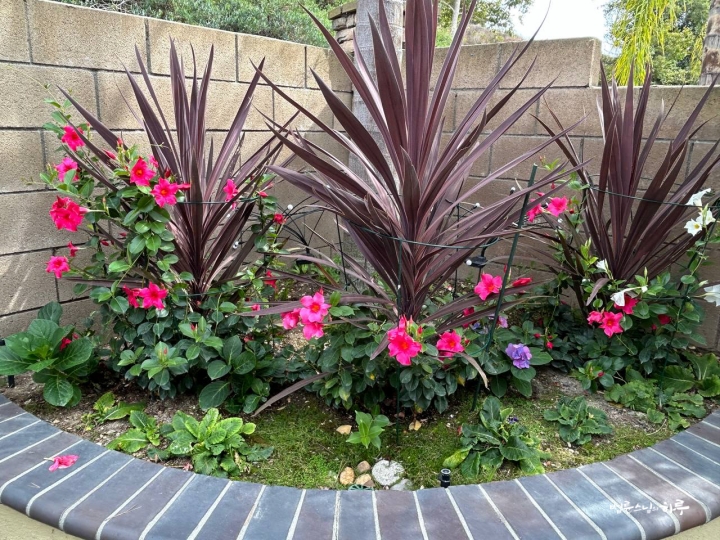
After finishing the lecture in Las Vegas yesterday, Sunim departed at 9:30 PM and arrived at Mr. Lee Kyung-taek’s residence in LA at 1:30 AM.
Sunim woke up at 6 AM and did morning practice and meditation at his accommodation. After breakfast at 8 AM, he briefly shared today’s schedule with everyone.
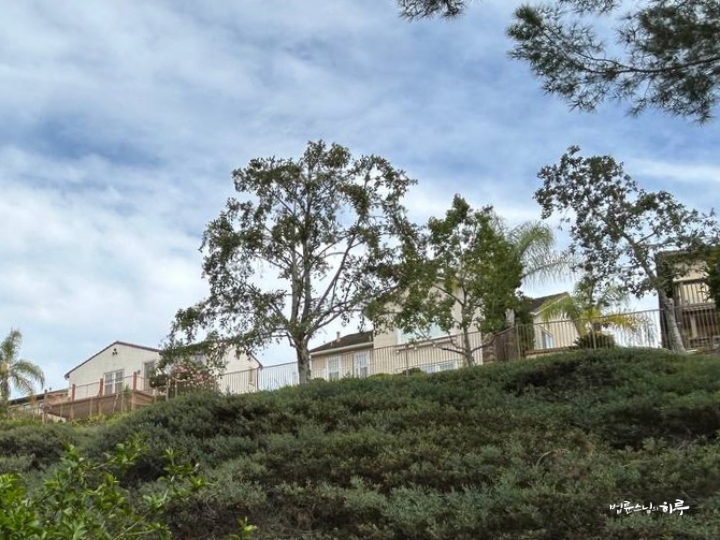
At 11 AM, Mr. Lee Seung-hoon and Ms. Ko Bon-hwa visited the accommodation to greet Sunim. After exchanging greetings, Sunim presented them with books he had brought from Korea. He also gave books along with a photo of the Buddha at the Mahabodhi Temple in Bodh Gaya to Mr. Lee Kyung-taek and Ms. Kim Myung-rye, who had provided accommodation and meals for three days. Sunim also expressed his gratitude to Ms. Lee Won-shim, who had prepared meals with great care for three days, by presenting her with a book. Mr. Lee Seung-hoon and Ms. Ko Bon-hwa, Mr. Lee Kyung-taek and Ms. Kim Myung-rye, and Ms. Lee Won-shim have all served in key roles such as secretary-general, general affairs manager, and representative at LA Jungto Society, helping Jungto Society take root in this region.
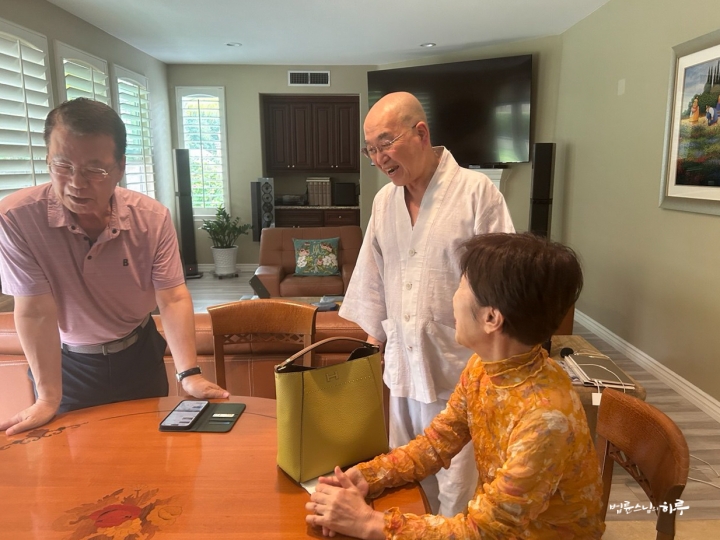
Soon, Park Gina, the representative of JTS USA, also arrived at the accommodation. She said she had arrived in the United States about a week ago and came to greet Sunim. After everyone exchanged warm greetings, they had lunch together.
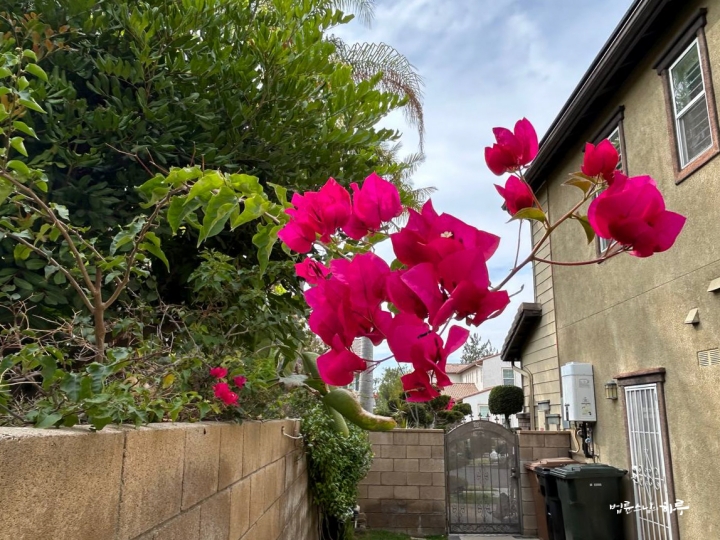
After lunch, they continued discussions about the year-end Korea visit schedule and future plans for establishing Jungto centers and retreat centers in the LA and Orange County areas. Currently, Korean residents in the LA area are increasingly moving to Orange County, and there are about 400 local offices or branches established by Korean companies in this area alone. They also discussed the idea of holding separate lectures next year in Fullerton in northern Orange County and Irvine in the south. After finishing the conversation, they promised to meet again in Korea at the end of the year and said their farewells.
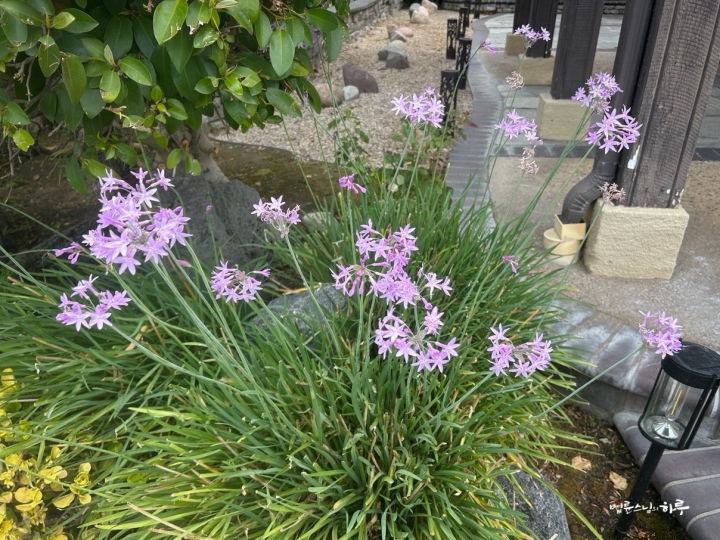
Since Sunim had to fly to Sydney, Australia immediately after today’s lecture, he packed all his luggage in advance and took care of personal matters in the afternoon.
From 2:30 PM, Sunim recorded a Dharma talk at the accommodation for the 30th anniversary celebration of Buddhistdoor Global, headquartered in Vancouver, Canada. Since Sunim would be in Jakarta on the anniversary date and couldn’t attend the event in person or give a live Dharma talk, it was decided to pre-record and send the video. Buddhistdoor Global requested a Dharma talk on the topic “How to Spread the Dharma in the Rapidly Changing AI Driven Digital Age.
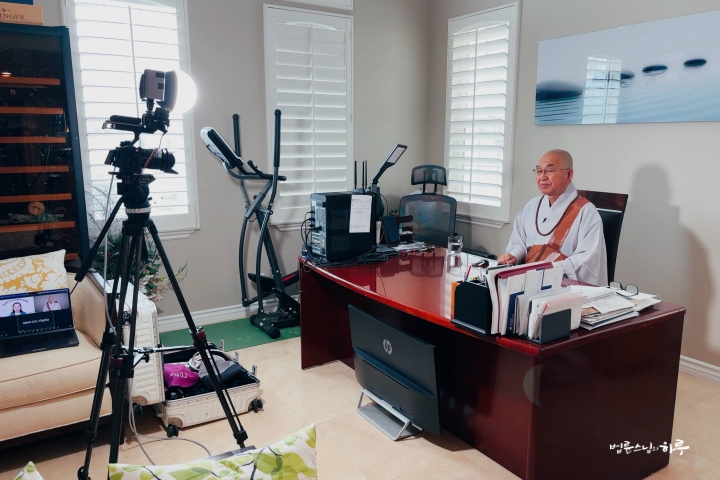
Sunim emphasized that even in the AI digital age, human suffering would still remain unresolved, and that Buddha’s teachings are the path to true freedom and peace. He also explained that digital technology is a good tool for spreading the Dharma widely, especially useful for communicating with younger generations. Finally, he emphasized that the Dharma should not be the exclusive property of monks or Buddhists, but should be widely spread for the happiness of all humanity, and conveyed his congratulations and encouragement for Buddhistdoor Global’s 30th anniversary.
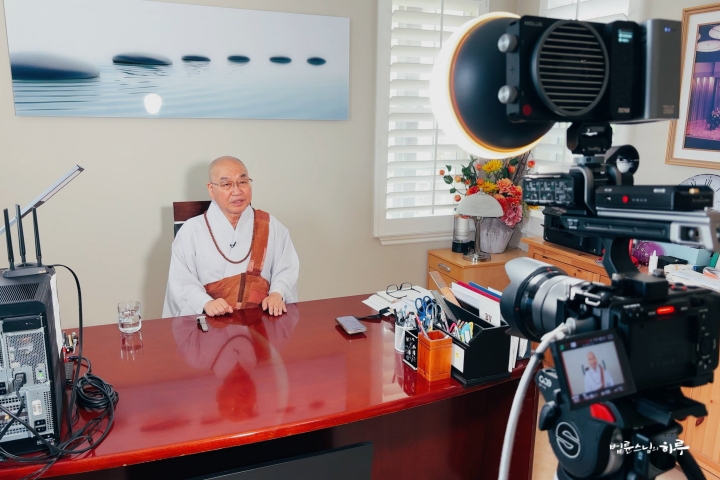
At 5 PM, Sunim departed for the lecture venue. Today’s lecture is being held at the DoubleTree by Hilton Buena Park, located in Buena Park, California. Sunim has been giving lectures at this venue every year when visiting Orange County.
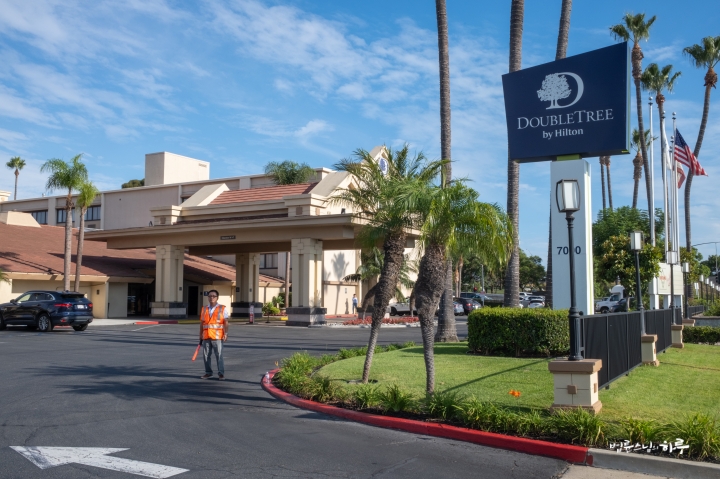
Upon arriving at the venue, Sunim warmly greeted the volunteers. Since Sunim had to leave for the airport immediately after the lecture, they took commemorative photos with the volunteers before the lecture began.
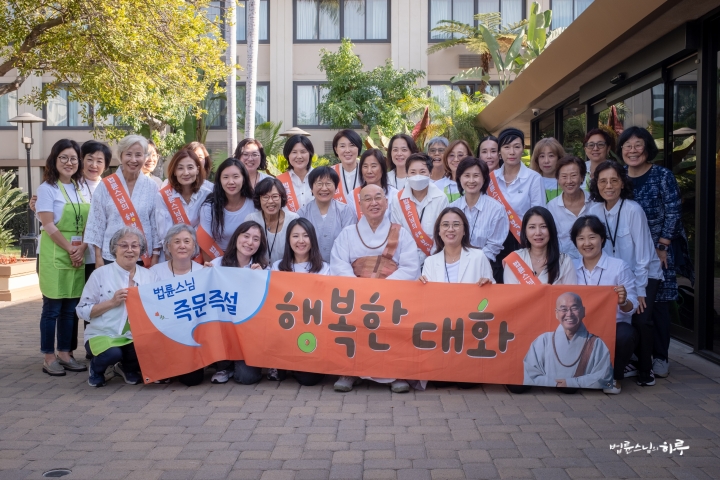
The volunteers who were guiding in the parking lot arrived late, so they took another commemorative photo separately. Everyone was delighted by Sunim’s consideration.
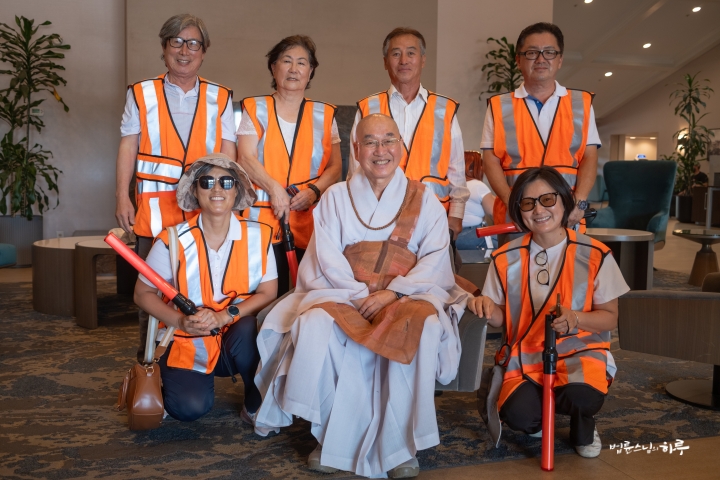
The book signing session was also held in advance before the lecture began.
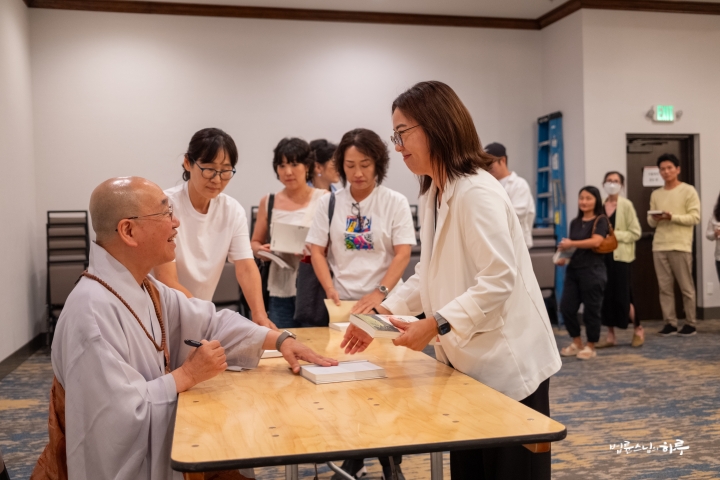
Just before the lecture began, the Mayor of Buena Park visited and presented Sunim with a plaque of appreciation.
“Thank you for holding lectures for the Korean community every year like this.”
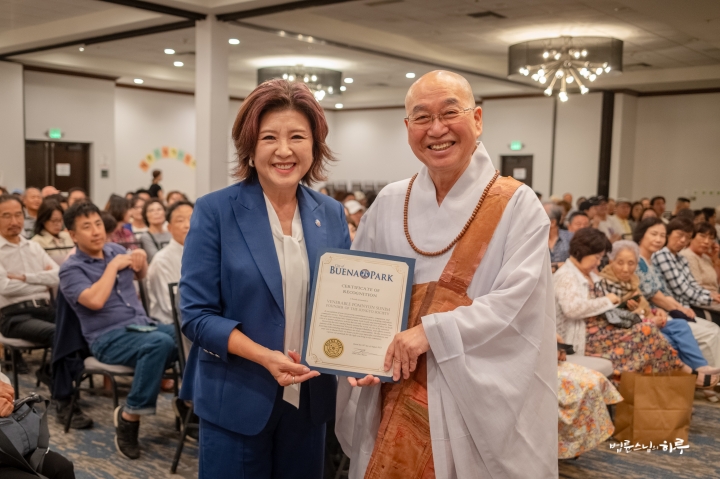
Many Korean residents came to the lecture hall today as well. Volunteers throughout the venue warmly welcomed the Korean community members.
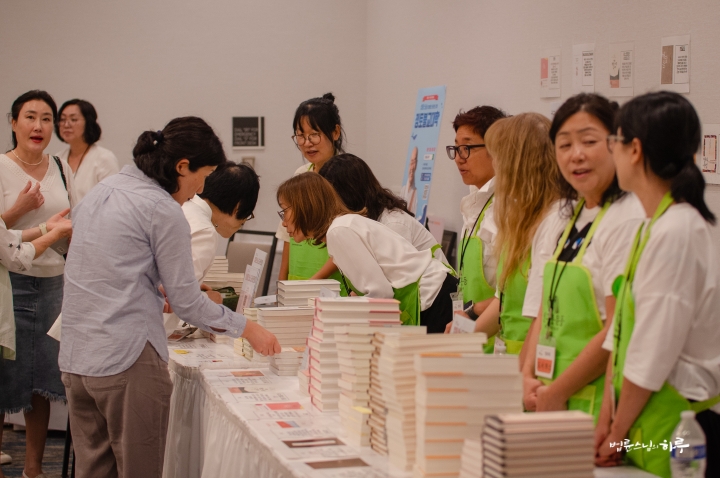
The Dharma Q&A began at 6 PM. As Sunim walked onto the stage, cheers and applause poured out. With about 230 people in attendance, Sunim gave his opening remarks.
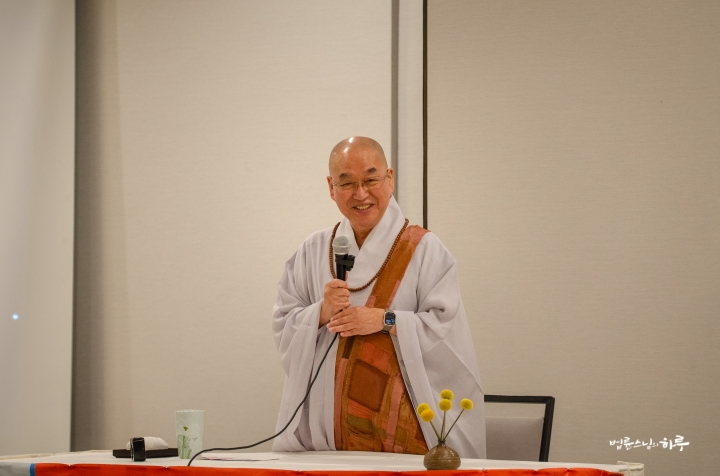
“As you all know well, Dharma Q&A is not a lecture format with a specific topic. When you raise various concerns you experience while living your life, we have a conversation about those issues and find solutions together – that’s what Dharma Q&A is. We share doubts and suffering and find a path within them. So what’s the best solution? It’s realizing that what you thought was a problem is actually not a problem at all. When you realize ‘This isn’t a problem,’ there’s no need to even solve it. The second-best method is to identify the cause of the problem and solve it wisely. So if during our conversation you say ‘It’s no big deal,’ that’s the best solution, and if you say ‘I can do it that way,’ that’s the next best solution.
A Place to Find Your Own Path, Not to Receive Answers
That’s why this isn’t ‘instant questions, instant answers.’ You keep calling it that and asking ‘How does Sunim give such good answers?’ but I don’t give answers – we just have a conversation. You find the solution yourself. During the conversation, you find the solution by saying things like ‘It’s no big deal’ or ‘I can do it that way.’ I’m just helping for a moment while having a conversation with the questioner. So no matter what question is asked, it’s not a burden to me because I’m not giving answers. This is what Dharma Q&A is. Now, let’s begin our conversation. Who would like to ask the first question?”
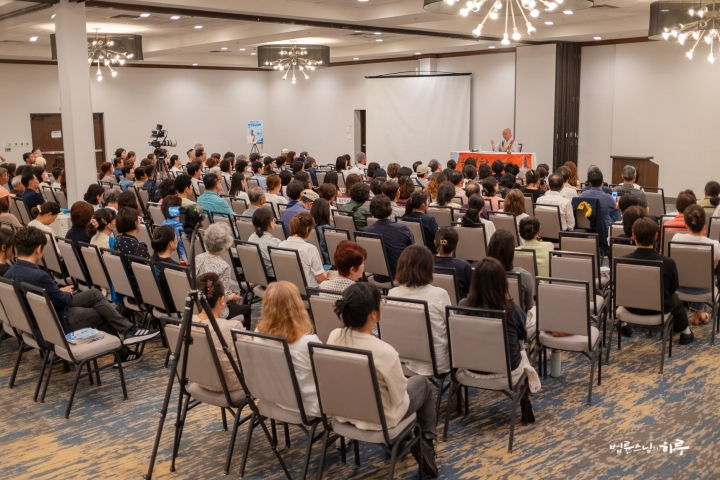
After having conversations with those who had submitted questions in advance, Sunim then took questions from the audience. During the two hours, nine people asked Sunim questions. One of them sought Sunim’s advice about feeling anger and sadness whenever hearing about animal abuse, and experiencing greater grief over their dog’s death than their parents’ deaths.
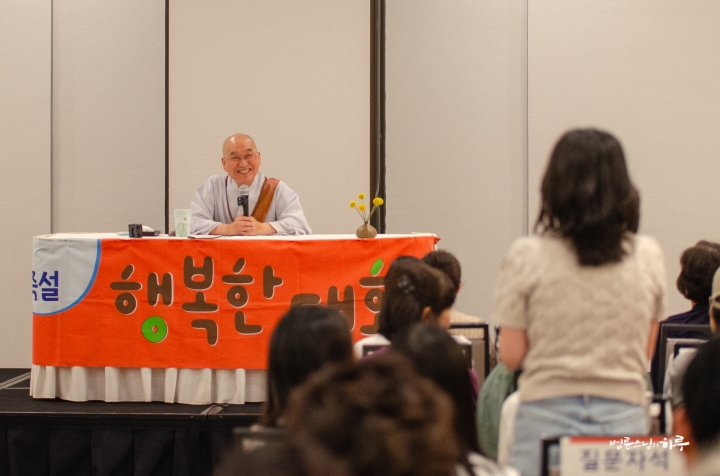
I Get Angry Whenever I Hear About Animal Abuse
“There is attachment to good things and attachment to bad things. Being attached to drugs is attachment to something bad. But like you, while you say you’re protecting animals, you’re actually attached to it. If we think about it sensibly, when comparing countless children dying from Israeli bombing in Gaza, Palestine, with dogs being abused, which should we feel more heartbroken about? Of course, I don’t mean animal abuse is acceptable. But if your heart is more shaken by animal abuse than human deaths, it’s not universal thinking. We could say your thinking is somewhat biased.
When Afghanistan fell to the Taliban and U.S. forces withdrew, foreigners and wealthy people living in Afghanistan abandoned their pets and fled on planes by themselves. But many locals including UN agency staff, NGO workers, and Christians who weren’t Muslims couldn’t all come together because there were no flights available. So countless people were crying out at the airport trying to get on planes. At that time, a European animal protection organization chartered a plane and took only the pets that were left there. I don’t mean taking pets is bad. But can we consider it normal to abandon countless people and take only pets? While this is a good deed, it’s actually behavior that comes from being too attached to pets. They didn’t care much about human life and death, but were so heartbroken about the fact that animals they loved so much were abandoned that they chartered a plane and brought only the pets. We can say it’s a good deed, but at the same time, it’s behavior that’s excessively biased to one side – attached behavior. You too can be seen as being attached to pets right now.
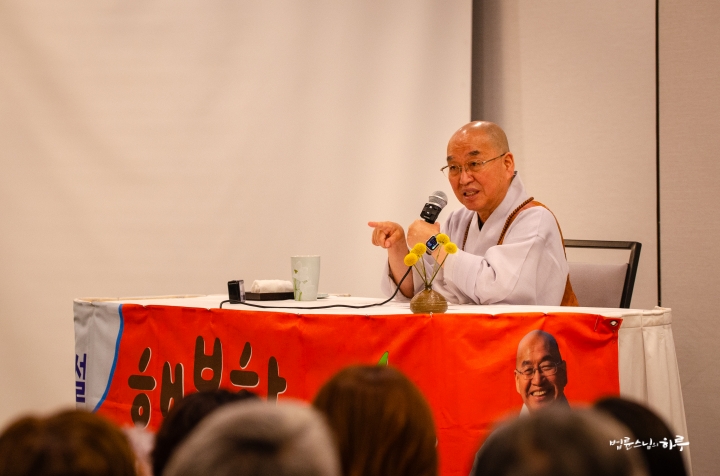
Starting in 1995, North Korea began experiencing the “Arduous March,” a period when many people died of starvation. From 1996, North Korean children began crossing the border and begging in the Yanbian Korean Autonomous Prefecture’s Yanji market in China, where they were called “Kkotjebi” (vagrant children). At that time, I prepared food, clothing, and medicine in Korean villages along the Tumen River and distributed them to people crossing the border, either sending them back to North Korea or protecting those who didn’t want to return. During this process, one of our female relief workers cried every day. We could only help about 20 children while avoiding the Chinese government’s watchful eyes, but there were over 100 children in the market. She cried every day seeing those children. So I called the worker and said this:
‘How does your crying help the begging children? Instead of crying, why don’t you make one more phone call to Korea to raise funds, or go to the Chinese government and request permission to care for the children? You need to do something that actually helps. Just crying doesn’t help those children.’
This is what we call emotional waste. Just crying doesn’t help the world at all. This emotional waste comes from ‘attachment.’ Although the intention is good, you’re attached to it.
You need to be aware that your current psychological state is one of attachment. There must be a reason for your attachment. It could be a phenomenon arising from childhood trauma – perhaps your parents sold a puppy you cherished, or it was forcibly taken away, leaving a wound in your young heart that’s now resurfacing. Sometimes people grieve more over a dog’s death than a person’s death. This problem arises because everyone has different objects of attachment. Starting today, whenever such emotions arise, practice quietly observing the root of these emotions. This will help calm you down a bit.”
I Was Sadder When My Dog Died Than When My Parents Passed Away
“I was much sadder when my beloved dog died than when my parents passed away. I continue to donate to animal protection organizations in my own way, but when I see animal abuse on television, I feel so frustrated that I can’t do anything. I don’t know how to manage my feelings at those times. I lived with my dog for 12 years and received so much comfort from it, and through that dog, I had the opportunity to open my heart.”
“You need to be aware that this problem arises from such attachment. You should do what you can within your capacity, whether it’s donating or doing something helpful, but crying won’t solve anything. If news of a dog being abused brings tears and heartache, but news of children dying in a shooting in Minnesota yesterday causes less pain, you need to recognize that you’re attached to one side. Your current psychological state isn’t so much from great compassion as it is a biased psychological state due to emotional wounds. So it would be good to receive some psychological therapy. That way, you can actively help with animal protection without the heartache.”
“Thank you. I understand well.”
Questions continued one after another.
I thought I wasn’t getting angry, but I was actually suppressing it. I wonder if I’m deceiving myself.
When doing business, should I focus on children’s treatment or mental health programs among existing treatments?
My divorced Sikh ex-husband is still obsessed with me. I want to start a new life. What should I do?
I gave lots of attention and treated my beloved sister and daughter well, but they eventually cut me off. I don’t understand why.
I have ‘aha!’ moments listening to Sunim’s words, but the effect soon wears off. How can I maintain peace of mind?
Buddhism is difficult. What religious activities can make Buddhism more accessible?
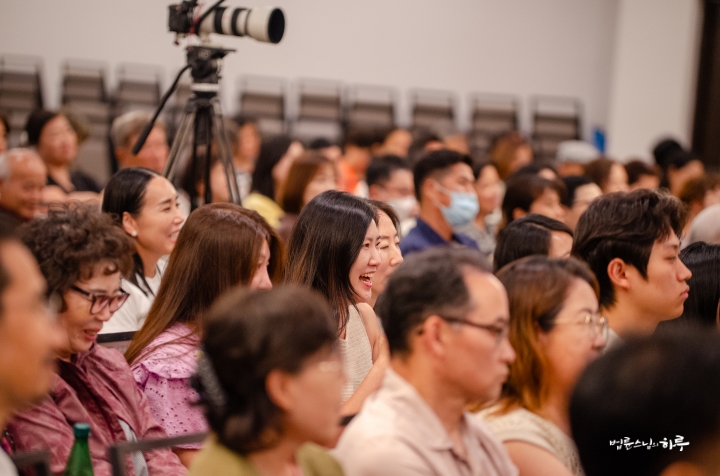
Before we knew it, it was well past 8 PM. As the lecture was coming to an end, someone raised their hand, torn between wanting to spend their retirement in Korea and the reality of needing to stay in America for their only son, seeking Sunim’s advice on what choice to make.
Should I Leave My Son and Go to Korea, or Stay in America Despite the Loneliness?
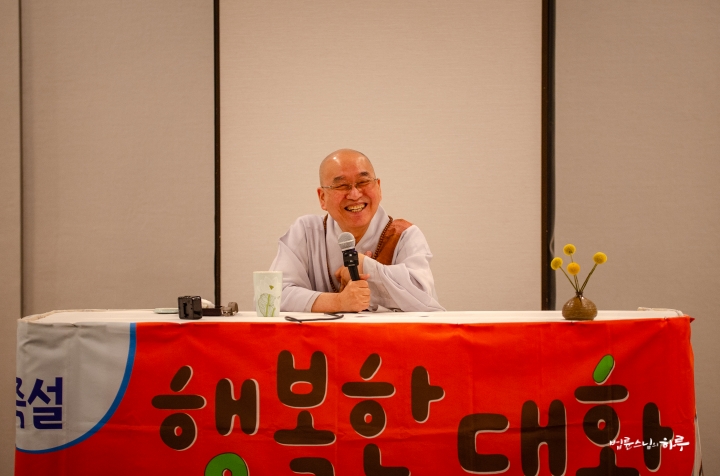
“Do whatever you like. Because you’re living in America, you want to live in Korea and miss your parents and siblings there. But if you actually go to Korea and see your parents and siblings every day, then you’ll miss America and want to see your son. When I said do whatever you like, I wasn’t joking – I’m saying that no matter what choice you make, it won’t be completely resolved.”
“That’s my worry.”
“Why is that a worry? Saying it can’t be resolved no matter what is a negative expression, but turned around, it means it’s okay no matter what you do.”
“That’s right. Living in America, I miss my mother and siblings every day, but if I go to Korea, I’ll probably miss my son every day.”
“Yes, of course. This isn’t your son’s problem or your parents’ problem – it’s a problem caused by your infantile psychology, your attachment. As an adult, you should be able to live quietly alone without seeing your parents or children. Your current psychology shows you’re still in an infantile state seeking your mother regarding your parents, and you still think of your son as a young child. So you think you need to take care of your son, and you still feel you need to receive more love from your parents. You’re still in the psychological state of a child who hasn’t been weaned. This problem arises because living abroad for so long hasn’t healed the wounds of separation. So this isn’t your mother’s problem or your son’s problem – it’s a problem arising from your psychology being bound by attachment. To heal this, you need to create work for yourself, perhaps volunteering somewhere, even if it’s not paid work.”
“That seems most important.”
“When you have meaningful volunteer work to do, missing your parents or children won’t affect you as much. So it would be good to keep your home in America and visit Korea frequently, even if it costs more for flights. When you go to Korea, stay for a while to heal your infantile psychological state. First, establish something you can do in America.
If you live in Korea for about six months and your infantile psychological condition worsens, making you miss your mother even more, then you might have to settle in Korea and travel back and forth to America.
Either way is fine, but the best approach would be to stay as you are now, first try what you can do here, and gradually increase your time in Korea. Most people in your situation think that if they go to Korea first, they can take care of their mother more, receive more love, see their siblings occasionally, and everything will be wonderful. But in reality, after just six months in Korea, it’s perfect for siblings to become enemies.” (laughter)
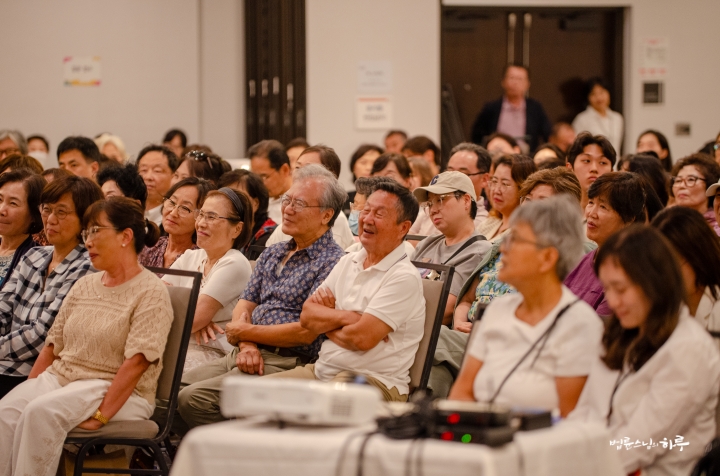
“I go to Korea every year and stay for two months. During that time, I go out every morning and come back at night without missing a single day. Even in the US, I meet people almost every day and gain energy by going out. However, since the US is a foreign country by my standards, there are limitations on who I can meet, and since most people work, there aren’t many people available to meet. Additionally, since there aren’t many places to go, the stress from environmental factors is significant.”
“Then for now, don’t move to Korea and keep your home in the US. You can visit Korea for two or three months, but just don’t stay more than six months out of the year. Because in the Trump era, you might not be able to return after a long stay. (Laughter) Within that range, it would be good to go and live in Korea. I’ve seen many people who packed everything and moved to Korea, couldn’t even last three years, and came back to the US, only to find that land and housing prices had gone up in the meantime, causing them hardship. So I recommend keeping your home in the US and staying in Korea for periods.”
“Actually, what worries me most is that someday I’ll find it difficult to even board a plane and the day will come when I leave this world. I’m afraid that if I’m in Korea at that time, my children won’t be by my side in my final moments. Since I think that’s highly likely, I keep wondering whether it’s right for me to leave for Korea or if it would be better to just stay in the US.”
“That’s why I told you – keep your home in the US and try living in Korea. You still don’t understand what I’m saying. (Laughter) What I mean is, keep your home in the US as it is and go stay in Korea for extended periods. Even if it means maintaining two households, that’s how you avoid regrets later. If you’ve lived in the US for 30 years, it won’t be easy to resettle and live in Korea again.
Also, while your mother is alive, there’s affection between siblings and even when you fight, you gather around your mother. But after your mother passes away, siblings essentially become strangers. Many people expect the sibling affection from childhood memories to continue, but in reality, when everyone is married with grandchildren at that age, there are very few siblings who maintain such close relationships. Of course, there are rare exceptions. That’s why it’s easy to be disappointed by siblings. So rather than going far away to where your old family members are, this place where your husband and children are might be better.”
“Yes, I understand. Thank you.”
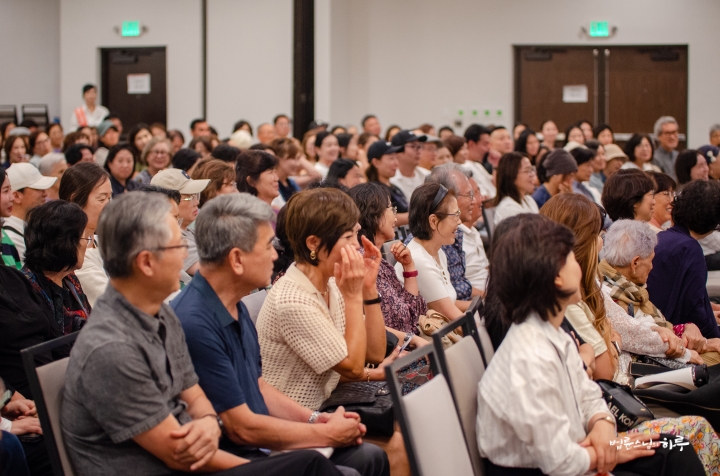
Although there were more people who wanted to ask questions, it was time to leave for the airport, so the lecture concluded.
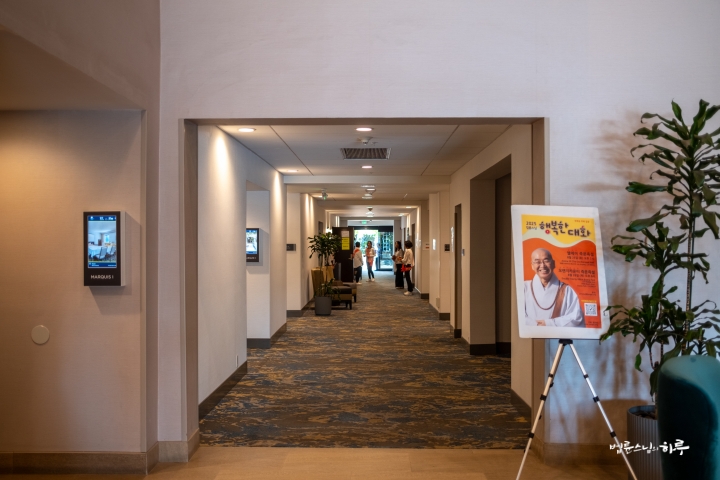
After the lecture ended, while the filming equipment was being packed up, Sunim held another book signing session for those who hadn’t received autographs. Among those present was a foreigner who had heard about the lecture on social media. Since he couldn’t understand Korean well, Dharma Teacher Hyomyeong provided brief interpretation. This person stayed until the end of the lecture and wanted to take a photo with Sunim, so they took a commemorative photo together. After the signing session, Sunim presented a signed book to Heo Jeong-yeon, who coordinated the Orange County lecture.
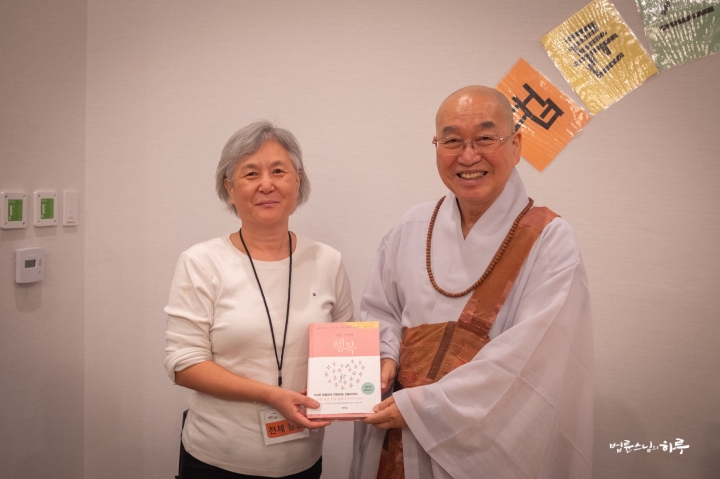
Since it was an opportunity to see Sunim again after a year, many people came to greet him warmly after the lecture. Many also expressed their joy about the resumption of in-person lectures. Go Bon-hwa, who came in a wheelchair, JTS President Park Gina, and professional golfer Kim In-kyung, who resides in San Diego, also visited the lecture hall to exchange greetings.
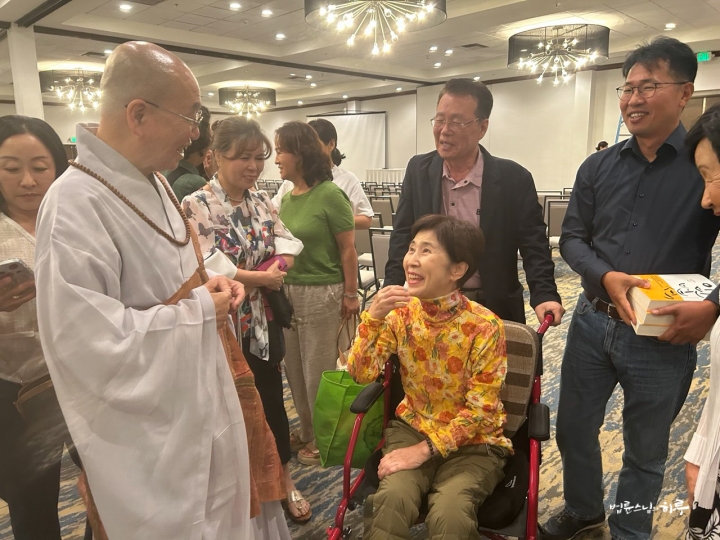
Once the filming equipment was packed, Sunim and his party immediately departed for Los Angeles International Airport.
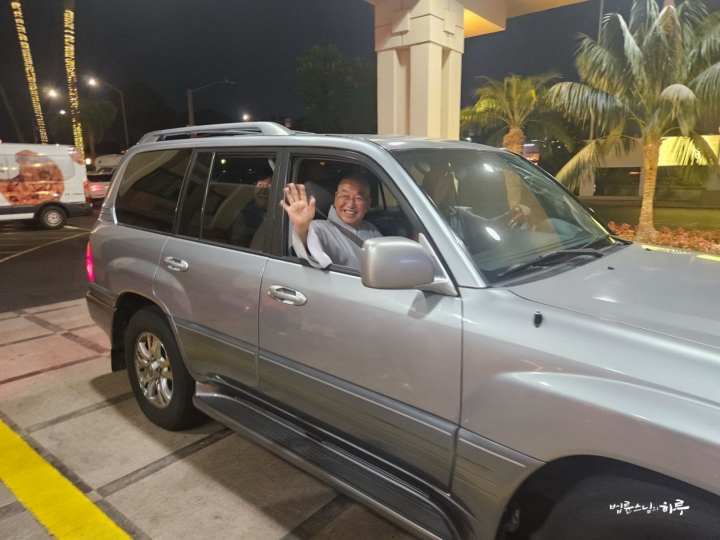
Although there was some traffic during the evening rush hour, they were able to arrive at the airport at 9:10 PM. Before entering the airport, Sunim expressed his gratitude to Lee Kyung-taek, who had driven for three days and provided accommodation.
After entering the airport, completing departure procedures, checking luggage, and passing through security screening, the process went relatively smoothly today. Before moving to the international terminal, Sunim bid farewell to Dharma Teacher Beophae, who had overseen all overseas lectures and accompanied him throughout the North American West Coast schedule. Sunim plans to re-enter the US on September 25 and continue his North American East Coast and Washington D.C. visit schedule starting September 26.
“Sunim, I’ll see you again in New York in a month.”
“Alright, thank you for your hard work.”
Sunim waited at the gate, then boarded the flight to Sydney and departed Los Angeles International Airport at 11 PM.
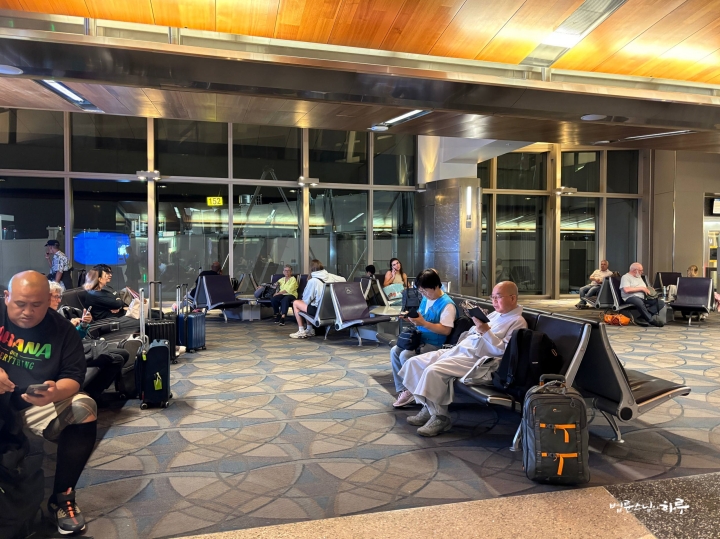
Tomorrow, after a 15-hour flight, he will arrive in Sydney, Australia at 7 AM local time on August 30 and begin his Oceania schedule.





